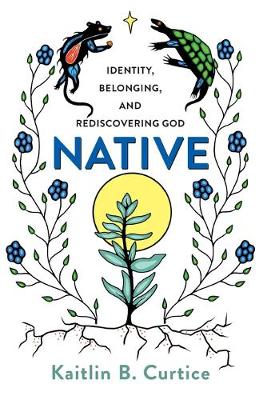
Foreword INDIES 2020 Book of the Year Award (SILVER Winner for Religion)
2021 Georgia Author of the Year Award (Inspirational)
2021 Midwest Book Award (Silver Winner for Religion/Philosophy)
Native is about identity, soul-searching, and the never-ending journey of finding ourselves and finding God. As both a citizen of the Potawatomi Nation and a Christian, Kaitlin Curtice offers a unique perspective on these topics. In this book, she shows how reconnecting with her Potawatomi identity both informs and challenges her faith.
Curtice draws on her personal journey, poetry, imagery, and stories of the Potawatomi people to address themes at the forefront of today's discussions of faith and culture in a positive and constructive way. She encourages us to embrace our own origins and to share and listen to each other's stories so we can build a more inclusive and diverse future. Each of our stories matters for the church to be truly whole. As Curtice shares what it means to experience her faith through the lens of her Indigenous heritage, she reveals that a vibrant spirituality has its origins in identity, belonging, and a sense of place.
In Native: Identity, Belonging, and Rediscovering God, Kaitlin Curtice shares how she learned she couldn’t get to know God while denying her Potawatomi identity. She takes us through her process of grappling with what it means to be a Potawatomi woman who belongs to a colonizing religion that all too often upholds and perpetuates white supremacy. She makes a clear, passionate, loving argument for why decolonization must be a top priority for the church, and how decolonization is a gift for everyone, not just the oppressed.
“I grew up in a church culture that rewarded people pleasing, that punished those who ask too many questions, that pushed out those who seemed too angry or grieved too long.”
I love how she makes it a point to remind everyone that marginalized people can go to church while feeling angry, feeling furious, asking hard questions, fighting against what is wrong within the church! Everyone’s story is important, and truth-telling is at the heart of this: listening and learning from one another, caring about each other’s experiences. This strengthens community, and we can fight injustice and systems of dehumanization together. This is good fruit!
This is such a loving book. Curtice has strong words that cry out against injustice, but her ideas for fighting injustice are grounded in loving one another. (She is so much like her friend Rachel Held Evans in this way.) When people are left out of the church, everyone suffers because they’re missing out on wonderfully rich, honest relationships. In this regard, decolonization is a spiritual matter. So, how do we find reconciliation? How do we come together? Curtice has a hopeful perspective throughout the book, as well as tangible suggestions for steps that can be taken to heal. She reminds us that there is room for everyone at the table.
Reading updates
-
Started reading
-
21 May, 2020:
Finished reading
-
21 May, 2020:
Reviewed
